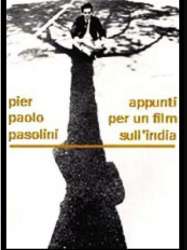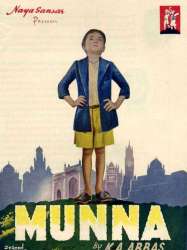Khwaja Ahmad Abbas is a Actor, Director, Scriptwriter and Producer Indian born on 6 june 1914 at Panipat (Inde)

Khwaja Ahmad Abbas (Hindi: ख़्वाजा अहमद अब्बास) (7 June 1914 – 1 June 1987), popularly known as K. A. Abbas, was an Indian film director, novelist, screenwriter, and a journalist in the Urdu, Hindi and English languages. He was the maker of important Hindi films such as Saat Hindustani (1969) and Do Boond Pani (1972), both of which won the National Film Award for Best Feature Film on National Integration, Palme d'Or nominated (Cannes Film Festival) Pardesi (1957) and Shehar Aur Sapna (1963), which won the National Film Award for Best Feature Film.
As a screenwriter, Khwaja Ahmad Abbas is considered one of pioneers of Indian parallel or neo-realistic cinema, having penned films like the Palme d'Or winner at the Cannes Film Festival, Neecha Nagar (1946), Jagte Raho, Dharti Ke Lal, Awara, Saat Hindustani and Naya Sansar. Apart from this, he wrote the best of Raj Kapoor films, Awaara, Shri 420, Mera Naam Joker, Bobby and Henna.
His column ‘Last Page’, holds the distinction of being one of the longest-running columns in the history of Indian journalism. The column began in 1935, in Bombay Chronicle, and moved to the Blitz after the Chronicle's closure, where it continued until his death in 1987. He was awarded the Padma Shri in 1969, by Government of India.
Khwaja Ahmad Abbas was born in Panipat, Haryana. He was born in the home of celebrated Urdu poet, 'Khwaja Altaf Husain Hali', a student of Mirza Ghalib. His grandfather Khwaja Gulam Abbas was one of the chief rebels of the 1857 Rebellion movement, and the first martyr of Panipat to be blown from the mouth of a cannon. Abbas's father Ghulam-Us-Sibtain graduated from Aligarh Muslim University, was a tutor of a prince and a prosperous businessman, who modernised the preparation of Unani medicines. Abbas's mother, 'Masroor Khatoon', was the daughter of Sajjad Husain, an enlightened educationist. Abbas took his early education in 'Hali Muslim High School', which was established by his great grand father Hali. He had his early education till 7th in Panipat. He was instructed to read the Arabic text of the Quran and his childhood dreams swung at the compulsive behest of his father. Abbas completed his matriculation at the age of fifteen. He did his B.A. with English literature in 1933 and LL.B. in 1935 from Aligarh Muslim University.
Abbas's family tree goes back to Aiyub Ansari, the companion of the Islamic prophet Muhammad.
Career
Abbas began his career as a journalist, when he joined 'National Call', a New Delhi based paper after finishing his B.A.. Later while studying law in 1934, started 'Aligarh Opinion', India's first university students' weekly during the pre-independence period.
After completing his education at Aligarh Muslim University, Abbas joined the Bombay Chronicle in 1935. He occasionally served a film critic, but after the film critic of the paper died, he was made the editor of the film section.
He entered films as a part-time publicist for Bombay Talkies in 1936, a production house owned by Himanshu Rai and Devika Rani, to whom he sold his first screenplay Naya Sansar (1941).
While at the Bombay Chronicle, (1935–1947), he started a weekly column called 'Last Page', which he continued when he joined the Blitz magazine. "The Last Page", (‘Azad Kalam’ in the Urdu edition), thus became the longest-running political column in India's history (1935–87). A collection of these columns was later published as two books. He continued to write for The Blitz and Mirror till his last days.
Meanwhile he had started writing scripts for other directors, Neecha Nagar for Chetan Anand and Dr. Kotnis Ki Amar Kahani for V. Shantaram.
In 1945, he made his directorial debut with a film based on the Bengal famine of 1943, Dharti Ke Lal (Children of the Earth) for the Indian People's Theatre Association (IPTA). In 1951, he founded his own production company called Naya Sansar, which consistently produced films that were socially relevant including, Anhonee, Munna, Rahi (1953), based on a Mulk Raj Anand story, was on the plight of workers on tea plantations, the National Film Award winner, Shehar Aur Sapna (1964) and Saat Hindustani (1969), which won the Nargis Dutt Award for Best Feature Film on National Integration and is also remembered as Bollywood icon, Amitabh Bachchan's debut film.
A prolific writer, and novelist, during his illustrious career spanning five decades, Abbas wrote over 73 books in English, Hindi and Urdu. Abbas was considered a leading light of the Urdu short story. His best known fictional work remains 'Inquilab', based Communal violence, which made him a household name in Indian literature. Like Inquilab, many of his works were translated into many Indian, and foreign languages, like Russian, German, Italian, French and Arabic.
Abbas interviewed several renowned personalities in literary and non-literary fields, including the Russian Prime Minister Khrushchov, American President Roosevelt, Charlie Chaplin, Mao-Tse-Tung and Yuri Gagarin.
He went on to write scripts for Jagte Raho, and most of the prominent Raj Kapoor films including Awaara, Shri 420, Mera Naam Joker, Bobby and Henna.
His autobiography, I Am not an Island: An Experiment in Autobiography, was first published in 1977 and later released in 2010.
Source : Wikidata
Khwaja Ahmad Abbas

Birth name Khwaja Ahmad Abbas
Nationality Inde
Birth 6 june 1914 at Panipat (Inde)
Death 1 june 1987 (at 72 years) at Maharashtra (Inde)
Awards Padma Shri
Nationality Inde
Birth 6 june 1914 at Panipat (Inde)
Death 1 june 1987 (at 72 years) at Maharashtra (Inde)
Awards Padma Shri
As a screenwriter, Khwaja Ahmad Abbas is considered one of pioneers of Indian parallel or neo-realistic cinema, having penned films like the Palme d'Or winner at the Cannes Film Festival, Neecha Nagar (1946), Jagte Raho, Dharti Ke Lal, Awara, Saat Hindustani and Naya Sansar. Apart from this, he wrote the best of Raj Kapoor films, Awaara, Shri 420, Mera Naam Joker, Bobby and Henna.
His column ‘Last Page’, holds the distinction of being one of the longest-running columns in the history of Indian journalism. The column began in 1935, in Bombay Chronicle, and moved to the Blitz after the Chronicle's closure, where it continued until his death in 1987. He was awarded the Padma Shri in 1969, by Government of India.
Biography
Early life and educationKhwaja Ahmad Abbas was born in Panipat, Haryana. He was born in the home of celebrated Urdu poet, 'Khwaja Altaf Husain Hali', a student of Mirza Ghalib. His grandfather Khwaja Gulam Abbas was one of the chief rebels of the 1857 Rebellion movement, and the first martyr of Panipat to be blown from the mouth of a cannon. Abbas's father Ghulam-Us-Sibtain graduated from Aligarh Muslim University, was a tutor of a prince and a prosperous businessman, who modernised the preparation of Unani medicines. Abbas's mother, 'Masroor Khatoon', was the daughter of Sajjad Husain, an enlightened educationist. Abbas took his early education in 'Hali Muslim High School', which was established by his great grand father Hali. He had his early education till 7th in Panipat. He was instructed to read the Arabic text of the Quran and his childhood dreams swung at the compulsive behest of his father. Abbas completed his matriculation at the age of fifteen. He did his B.A. with English literature in 1933 and LL.B. in 1935 from Aligarh Muslim University.
Abbas's family tree goes back to Aiyub Ansari, the companion of the Islamic prophet Muhammad.
Career
Abbas began his career as a journalist, when he joined 'National Call', a New Delhi based paper after finishing his B.A.. Later while studying law in 1934, started 'Aligarh Opinion', India's first university students' weekly during the pre-independence period.
After completing his education at Aligarh Muslim University, Abbas joined the Bombay Chronicle in 1935. He occasionally served a film critic, but after the film critic of the paper died, he was made the editor of the film section.
He entered films as a part-time publicist for Bombay Talkies in 1936, a production house owned by Himanshu Rai and Devika Rani, to whom he sold his first screenplay Naya Sansar (1941).
While at the Bombay Chronicle, (1935–1947), he started a weekly column called 'Last Page', which he continued when he joined the Blitz magazine. "The Last Page", (‘Azad Kalam’ in the Urdu edition), thus became the longest-running political column in India's history (1935–87). A collection of these columns was later published as two books. He continued to write for The Blitz and Mirror till his last days.
Meanwhile he had started writing scripts for other directors, Neecha Nagar for Chetan Anand and Dr. Kotnis Ki Amar Kahani for V. Shantaram.
In 1945, he made his directorial debut with a film based on the Bengal famine of 1943, Dharti Ke Lal (Children of the Earth) for the Indian People's Theatre Association (IPTA). In 1951, he founded his own production company called Naya Sansar, which consistently produced films that were socially relevant including, Anhonee, Munna, Rahi (1953), based on a Mulk Raj Anand story, was on the plight of workers on tea plantations, the National Film Award winner, Shehar Aur Sapna (1964) and Saat Hindustani (1969), which won the Nargis Dutt Award for Best Feature Film on National Integration and is also remembered as Bollywood icon, Amitabh Bachchan's debut film.
A prolific writer, and novelist, during his illustrious career spanning five decades, Abbas wrote over 73 books in English, Hindi and Urdu. Abbas was considered a leading light of the Urdu short story. His best known fictional work remains 'Inquilab', based Communal violence, which made him a household name in Indian literature. Like Inquilab, many of his works were translated into many Indian, and foreign languages, like Russian, German, Italian, French and Arabic.
Abbas interviewed several renowned personalities in literary and non-literary fields, including the Russian Prime Minister Khrushchov, American President Roosevelt, Charlie Chaplin, Mao-Tse-Tung and Yuri Gagarin.
He went on to write scripts for Jagte Raho, and most of the prominent Raj Kapoor films including Awaara, Shri 420, Mera Naam Joker, Bobby and Henna.
His autobiography, I Am not an Island: An Experiment in Autobiography, was first published in 1977 and later released in 2010.
Usually with
Filmography of Khwaja Ahmad Abbas (32 films)
Actor

Notes for a Film in India (1968)
Directed by Pier Paolo Pasolini
Genres Documentary
Themes Documentaire sur une personnalité
Actors Khwaja Ahmad Abbas, Pier Paolo Pasolini, Rajinder Singh Bedi
Roles Self
Rating70%





En Inde, Pasolini pose la question : « Donneriez-vous votre corps pour nourrir des tigres qui meurent de faim ? ».
Director

Ek Aadmi (1988)
Directed by Khwaja Ahmad Abbas
Actors Shabana Azmi, Pankaj Kapur, Parikshit Sahni, Supriya Pathak, Tun tun (Uma Devi Khatri), Tinnu Anand

The Naxalites (1980)
, 2hDirected by Khwaja Ahmad Abbas
Themes Political films
Actors Mithun Chakraborty, Smita Patil, Dina Pathak, Nana Palsikar, Jalal Agha, Asit Sen
Rating69%





The Naxalites is the story of Naxalites and their life struggle.

Faslah (1974)
Directed by Khwaja Ahmad Abbas
Genres Drama, Crime, Romance
Actors Shabana Azmi, Dinesh Thakur, Yunus Parvez, Florence Ezekiel Nadira, Paidi Jairaj, Vinod Mehra
Rating25%






Two Drops of Water (1971)
, 2h21Directed by Khwaja Ahmad Abbas
Genres Drama
Actors Simi Garewal, Kiran Kumar
Rating62%






Two Drops of Water (1971)
, 2h21Directed by Khwaja Ahmad Abbas
Genres Drama
Actors Simi Garewal, Jalal Agha, Kiran Kumar
Rating62%





Ganga Singh (Jalal Agha), newly married to Gauri (Simi Garewal), brings his wife to his village where he lives with his father Hari Singh (Sajjan), and sister Sonki (Madhu Chanda). The village is suffering from drought and villagers have to travel a long distance to get water. Ganga Singh hears of a dam being constructed and leaves his wife to join in the building of it. His family goes through misfortunes, with his father dying and his sister being raped by the dacoit Mangal Singh. Ganga himself dies preventing a disaster at the dam. The dam is eventually built bringing greenery to an arid region. His wife bears a son and lives on in the village.

Saat Hindustani (1969)
, 2h24Directed by Khwaja Ahmad Abbas
Genres War
Actors Utpal Dutt, Madhu, Amitabh Bachchan, Anwar Ali, Jalal Agha, A. K. Hangal
Rating63%





A Muslim poet Anwar Ali (Amitabh Bachchan) hails from Bihar and five other men, all belonging from different religions and different parts of India, join their seventh comrade Maria (Shehnaz), a native of Portuguese-occupied Goa, to raise nationalist sentiments in that state by hoisting Indian flag on Portuguese forts and buildings.
 , 2h16
, 2h16Directed by Khwaja Ahmad Abbas
Genres Thriller
Actors Persis Khambatta, David Abraham, Yunus Parvez, A. K. Hangal, Prithviraj Kapoor, Irshad Panjatan
Rating60%






Sky palace (1965)
, 2h52Directed by Khwaja Ahmad Abbas
Actors Nana Palsikar, David Abraham, Prithviraj Kapoor
An elderly impoverished Nawab lives in his ancestral Haveli (Mansion). A business man wants to buy it, in order to convert it into a hotel. Though financially in a desperate state, the Nawab refuses to sell his property and clings on to his old-fashioned ideals of nobility. His son, however, is more in tune with the changing times and is in love with the daughter of the house help.

Hamara Ghar (1963)
, 2h32Directed by Khwaja Ahmad Abbas
Actors Nana Palsikar
Children from different social backgrounds and ethnicity are travelling on a steamer bound for Goa. When they are marooned on a deserted island, they get together and build a shelter called Hamara Ghar (Our House). Several incidents take place like a near-drowning, discovery of hidden treasure, different factions in the group, which are all dealt with in a spirit of togetherness. However, despondency soon settles in, and they wait to be rescued. Finally a search helicopter finds them and they leave the island, with their shelter, Hamar Ghar, still standing.

Eleven Thousand Girls (1962)
, 2h32Directed by Khwaja Ahmad Abbas
Genres Drama
Actors Bharat Bhushan, Mala Sinha, Florence Ezekiel Nadira, David Abraham, Helen Khan
Asha (Mala Sinha) is in court facing a murder trial. Puran (Bharat Bhushan), a lawyer and journalist, takes the case. The story then goes into flashback, showing Asha working in the rationing office just after the war. She comes from a poor family and is the sole earning member. She also has six younger sisters to take care of. Puran comes from a rich family; his father is Seth Mulchand, a business man. However, Puran decides to work for a newspaper, as a reporter. Asha likes Puran's articles exposing corruption and black-marketing, and his articles on working women. She gets interested in meeting the writer. The two meet in her office at her place of work. While leaving, Puran manages to drop his papers, and they get jumbled up with the papers on Asha's desk. Her paycheck, which was lying on the desk, is picked up by Puran by mistake along with his own papers. She meets Puran again to get her check back.

Shehar Aur Sapna (1961)
, 2hDirected by Khwaja Ahmad Abbas
Actors Nana Palsikar, David Abraham, Manmohan Krishna Chadha, Asit Sen, Asit Sen
Rating63%






Four Hearts, Four Roads (1959)
, 2h40Directed by Khwaja Ahmad Abbas
Genres Drama
Actors Raj Kapoor, Ajit Khan, Shammi Kapoor, Meena Kumari, Nimmi, Kumkum
Rating72%





The story revolves around three love stories that run simultaneously among. The background of the movie is a construction of a crossroad with 4 roads and all people are related to the road that is being built and are involved. How the love stories unfold forms the crux of the movie.

Journey Beyond Three Seas (1957)
, 1h50Directed by Khwaja Ahmad Abbas
Genres Adventure, Historical
Actors Nargis, Padmini Ramachandran, Balraj Sahni, Bharat Bhushan, Prithviraj Kapoor, Paidi Jairaj
Rating67%





The film tells the story of Afanasy Nikitin (Oleg Strizhenov), a 15th-century, Russian trader who travelled to India (1466-1472), and falls in love with an Indian girl Champa (Nargis Dutt).

Munna (1954)
, 2h19Directed by Khwaja Ahmad Abbas
Genres Drama
Actors Syed Ishtiaq Ahmed Jaffery, Achala Sachdev, Paidi Jairaj, Manmohan Krishna Chadha, David Abraham, Madan Puri
Munna (Romi) is a six-year-old boy who lives with his poor widowed mother (Tripti Mitra). In the city, the mother is finding it hard to find get food for him. Finally Munna's mother unable to fend for Munna, leaves him at an orphanage. Munna escapes from there to look for his mother and they cross several times only to miss each other at different places in the city. His journey results in him coming across several characters; bringing a change in their lives. The story also involves a couple who wants to adopt Munna.
 Connection
Connection

